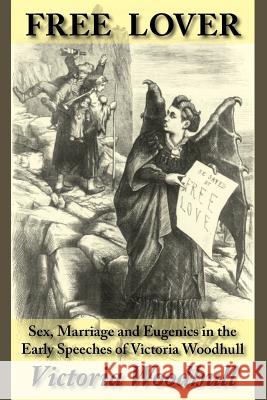Free Lover: Sex, Marriage and Eugenics in the Early Speeches of Victoria Woodhull » książka
Free Lover: Sex, Marriage and Eugenics in the Early Speeches of Victoria Woodhull
ISBN-13: 9781587420504 / Angielski / Miękka / 2005 / 184 str.
Aldous Huxley's Brave New World was fiction. Victoria Woodhull's Brave New World was to be terrifyingly real. As the first female Wall Street brokers, Victoria Woodhull and her sister Tennie had reputations to protect. They fretted about Tennie's well-publicized remark, "Many of the best men in Wall] Street know my power. Commodore Vanderbilt knows my power." She had meant her skill as a fortune teller, but the press quite rightly picked up hints the attractive pair traded sexual favors for assistance in their business. To make matters worse, in their magazine the sisters had published articles promoting free love, while distancing themselves from what was said. Taking the offensive, Victoria moved, step by step, until in a speech on November 20, 1871, she boldly proclaimed: "And to those who denounce me for this I reply: 'Yes, I am a Free Lover. I have an inalienable, constitutional, and natural right to love whom I may, to love as long or as short a period as I can; to change that love every day if I please, and with that right neither you nor any law can frame any right to interfere.'" Having come out of the closet, she had to defend that lifestyle from those who warned that it meant social ruin. In speeches across the country, she championed a new society that, in its nineteenth-century context, was remarkable similar to Huxley's 1932 classic, Brave New World. Babies were not grown in bottles, but pregnant women were to be treated as "laboring for society," "paid the highest wages," and once the baby was weaned, "the fruit of her labor will of right belong to society and she return to her common industrial pursuits." To critics who warned that free love meant children growing up without parents, she replied that, "not more than one in ten" mothers was competent, and that parents should be replaced by the State because, "It is but one step beyond compulsory education to the complete charge of children." In her Brave New World, you could have all the sex you could attract, but it would be impossible to be a genuine parent.
Aldous Huxleys Brave New World was fiction. Victoria Woodhulls Brave New World was to be terrifyingly real.As the first female Wall Street brokers, Victoria Woodhull and her sister Tennie had reputations to protect. They fretted about Tennies well-publicized remark, "Many of the best men in [Wall] Street know my power. Commodore Vanderbilt knows my power." She had meant her skill as a fortune teller, but the press quite rightly picked up hints the attractive pair traded sexual favors for assistance in their business. To make matters worse, in their magazine the sisters had published articles promoting free love, while distancing themselves from what was said. Taking the offensive, Victoria moved, step by step, until in a speech on November 20, 1871, she boldly proclaimed:"And to those who denounce me for this I reply: Yes, I am a Free Lover. I have an inalienable, constitutional, and natural right to love whom I may, to love as long or as short a period as I can; to change that love every day if I please, and with that right neither you nor any law can frame any right to interfere."Having come out of the closet, she had to defend that lifestyle from those who warned that it meant social ruin. In speeches across the country, she championed a new society that, in its nineteenth-century context, was remarkable similar to Huxleys 1932 classic, Brave New World. Babies were not grown in bottles, but pregnant women were to be treated as "laboring for society," "paid the highest wages," and once the baby was weaned, "the fruit of her labor will of right belong to society and she return to her common industrial pursuits."To critics who warned that free love meant children growing up without parents, she replied that, "not more than one in ten" mothers was competent, and that parents should be replaced by the State because, "It is but one step beyond compulsory education to the complete charge of children." In her Brave New World, you could have all the sex you could attract, but it would be impossible to be a genuine parent.











